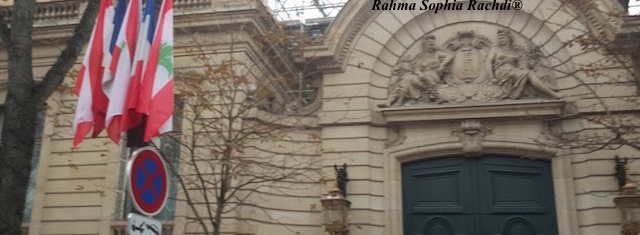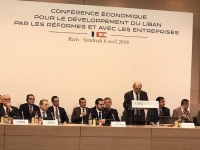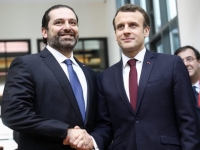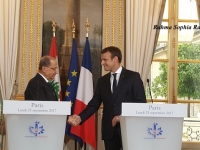Business
ECONOMIC CONFERENCE FOR DEVELOPMENT THROUGH REFORMS WITH THE PRIVATE SECTOR
PARIS ON APRIL 6TH CALLED CEDRE

Flag Lebanon Elysee (Source: Rahma Sophia Rachdi, J Foster)
USPA NEWS -
Lebanon received 11 million Euros from France for the conference "CEDRE", which took place on 6 April 2018, chaired by Jean Yves le Drian, French Ministry of Foreign Affairs, and under the High Patronage of the President of the Republic Emmanuel Macron.The conference will mobilize a little more than 11 billion public commitments. We are collectively behind Lebanon considering all the challenges of the moment and all the challenges of the region. This explains the unprecedented mobilization of the international community and the success of this conference. But that's what gives you, and sorry for that again, an equally unprecedented responsibility, to preserve the treasure that is Lebanon in the region by what it represents and what it is, " said, President Emmanuel Macron.--------------------------------------------------------------------
About 50 states and international organizations were mobilizing to help the country finance its multi-year development plan. An "emergency", according to Emmanuel Macron, the French president, to preserve the stability of a country whose infrastructure is weakened by regional crises and in particular the influx of refugees from neighboring Syria.
About 50 states and international organizations were mobilizing to help the country finance its multi-year development plan. An "emergency", according to Emmanuel Macron, the French president, to preserve the stability of a country whose infrastructure is weakened by regional crises and in particular the influx of refugees from neighboring Syria.
TRANSCRIPT OF THE INTERGITY OF « CEDRE » JOINT STATEMENT----------------------------------------------------------
1-CEDRE (Conférence économique pour le développement, par les réformes et avec les entreprises), an international conference in support of Lebanon development and reforms, was hosted by France on 6 April 2018. Emmanuel Macron, President of the French Republic, and Mr Saad Hariri, Prime Minister of the Republic of Lebanon, addressed the Conference. The conference was chaired by Mr Jean-Yves Le Drian, France´s Minister for Europe and Foreign Affairs and by Mr Bruno Le Maire, France´s Minister for Economy and Finance. 48 countries and institutions took part in the meeting, with some representatives from the private sector and from civil society.-----------------------------------------------------------------------------
2- In line with the statements of the meeting of the International Support Group held in Paris on 8 December 2017 and the ministerial meeting in support of Lebanon´s armed forces and internal security forces, held in Rome on 15 March 2018, the participants expressed their commitment to the unity, stability, security sovereignty and territorial integrity of Lebanon, urging Lebanon´s leaders to implement and further expand a tangible policy of disassociation. They also expressed their support for the ongoing efforts of the Lebanese authorities to improve the functioning of State institutions and prepare the holding of legislative elections in accordance with international standards. They shared the view that, for a number of years, Lebanon has faced important challenges impeding its economic and human development. Lebanon needs the full support and solidarity of the international community, at a crucial juncture.---------------------------------------------------------------------------
3-Participants welcomed the return to normal functioning of state institutions: the election of the President, the appointment of a national unity government, the adoption of a new electoral law, which will be followed by parliamentary elections, scheduled to take place on 6 May. They also welcomed the senior appointments to fill vacancies in the public administration. They noted the first oil and gas tenders. They further commended the adoption of the budget in 2017 for the first time in 12 years and welcomed the recent adoption of the 2018 budget, as well as the adoption of the water code-----------------------------
4- Despite favorable recent developments, Lebanon continues to face vulnerabilities and mounting challenges. The conflict in Syria and the resulting displacement of population and mass influx of refugees and displaced into Lebanon have affected the Lebanese economy, its infrastructure and social services. Unemployment, which was already high particularly among the youth, has sharply increased. More than 200.000 Lebanese have been pushed into poverty. These are important challenges for Lebanon, which, by hosting displaced populations, provides a global public good on behalf of the international community. To this end participants look forward to the holding in Brussels of the “Supporting the future of Syria and the region“ conference, on April 24-25 at the invitation of the European Union and the United Nations.
5- Fundamentally the economic recovery and long term development of Lebanon are hindered by structural problems: high fiscal deficit (around 10 % of GDP) and high level of public debt (around 150 % of GDP), resulting in a major drop in capital expenditures to less than 1 percent of GDP per year. The GDP growth rate remains low.
6-Prime Minister Hariri presented the Lebanese government´s “Vision for stabilization, growth and employment“, which was welcomed by all participants. This vision is based on four pillars: (1) increasing the level of public and private investment; (2) ensuring economic and financial stability through fiscal adjustment; (3) undertaking essential sectoral reforms and cross-sectoral reforms, including fighting corruption, modernization of the public sector and public finance management; (4) developing a strategy for the reinforcement and diversification of Lebanon´s productive sectors and the realization of its export potential.---------------------------------------------------------------------------------------------------------------------------------
7- The government of Lebanon presented its ambitious Capital Investment Program (CIP), which is mainly focused on infrastructure development and rehabilitation. The total cost of the first phase of the CIP (covering 6 years for preparatory works and implementation) is estimated at US $10.8 billion (including expropriation costs), of which around 35 % could come from private investment. Taking into account the scope and ambition of this Program, and the overall positive assessment by the World Bank Group, participants decided to contribute to the 1st phase of the Program, while, in parallel, supporting the Government´s implementation of reforms and institutional strengthening, which are critical to the Program´s successful delivery and Lebanon´s macroeconomic stability. They emphasized some sectoral priorities of Lebanon´s government: energy, water, and waste management, which are essential for the population´s needs. They also noted the importance of private sector investment in the transport sector. Public transport remain a major investment target for the government. Participants commended the adoption of the Public Private Partnership law, which lays the basis for private participation in public sector projects. Moreover participants emphasized the need to increase investment and expenditure in social sectors, including health and education. Participants also encouraged the government and the World Bank Group to keep working on the CIP, including on the prioritization and the phasing of projects, and to ensure that necessary sectoral reforms are implemented on time. Appreciation was expressed for the important work done by the international organizations in Lebanon.
8- Recognizing that sound fiscal management is central to improving the confidence of international investors, both private and public, the Lebanese Government, supported by the donor community, commits to a challenging fiscal consolidation target of five percentage points of GDP over the next five years, through a combination of revenue measures (including improved collection of taxes) and expenditure measures, such as a reduction of transfers to Electricité du Liban (EdL), allowing a primary surplus. These are crucial steps to support macroeconomic stability, to gradually reduce public debt, and to generate the best outcomes of the CIP, including a sustainable stimulation of growth.----------------------------------------------
9-Participants commended the measures adopted before the Conference to build confidence with the international community, donors and the private sector. This includes speeding up the implementation of projects already committed, signing and ratifying loans, and allocation as well as disbursement of local counterpart funds. This should also include the allocation of human and financial resources to the High Council for Privatization and Partnership.
10- The Lebanese Government recognizes that the implementation of structural and sectoral reforms is critical to attract new investment and implement modern and strategic infrastructure. The Government committed to reforms, which are needed to address structural difficulties and loopholes, and foster public and private investment in a sustainable way. Regarding structural reforms, the Lebanese government stressed that fighting corruption, strengthening governance and accountability, including public finance management, modernizing procurement rules, reforming customs and improving public investment management are of utmost importance.. In addition, Lebanese authorities will continue to strengthen their anti-money laundering efforts and to take steps to counter the financing of terrorism in line with international standards. Regarding sectoral reforms, three fields are considered to be essential, to make the CIP a success: as regards electricity, an ambitious tariff reform alongside increased power generation; in the water management field, the implementation of the water code is crucial; in the field of waste management a new strategy, based on decentralization is underway. They finally agreed that an inclusive approach that takes into account effects on women would further bolster international support.--------------------------
11- In this enabling context, participants considered that, given Lebanon's high debt levels, concessional financing and private investment are the best instruments to invest in infrastructure and create jobs, along with the implementation of a consistent budgetary and fiscal adjustment program. They pledged their support to Lebanon´s investment and reforms program for Phase I:
- US$ 10.2 billion loans have been pledged, including 9.9 billion in concessional terms
- US$ 0,86 billion grants (including grants to subsidize loans)
They encouraged the private sector to participate to the financing of the CIP, on a project basis.
12- Participants attach the utmost importance to a robust follow-up mechanism for this conference, to ensure that commitments, reforms and pledges will be implemented.----------------------------------------------------------------------------------
The Lebanese government, with the support of donors and investors, intends to streamline their procedures for clearance, approval and implementation of externally funded projects. Streamlining the procedures will make the implementation of the CIP more successful and will help build trust with key stakeholders. In this regard, participants welcomed the Lebanese government´s commitment to strengthen implementation capacity, with international support, ensuring it meets international standards on transparency, accountability, anti-money laundering and combating the financing of terrorism.
A coordination mechanism between donors and authorities, informed by a continuous dialogue with the private sector and the civil society, will be set up in Beirut. Regular follow-up meetings of senior officials from capitals and headquarters will be organized. A dedicated web-site will be designed to ensure transparency on project financing and implementation.
13- Partner countries and institutions look forward to working with the new Government of Lebanon, after the next parliamentary elections, on the implementation of the CIP and of the reform agenda, including developing a concrete time-table for reforms. They will meet at the level of senior officials from capitals and headquarters soon after a new government is formed." Source French Foreign Affairs Minister See also article : PRESIDENT MACRON WELCOMES THE PRESIDENT OF LEABANON MICHEL AOUN & INAGURATE ORIENT CHRISTIANS EXHIBIT http://www.uspa24.com/bericht-12064/president-macron-welcomes-the-president-of-leabanon-michel-aoun.html
French Foreign Affairs Minister Jean Yves Le Drian President Macron Pm Saad Hariri Lebanon Bruno Le Maire French Minister For Economy And Finance Jedi Foster Rahma Sophia Rachdi
Liability for this article lies with the author, who also holds the copyright. Editorial content from USPA may be quoted on other websites as long as the quote comprises no more than 5% of the entire text, is marked as such and the source is named (via hyperlink).








